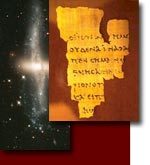| Site Map | Contacts | Links | Newsletter | |
Genesis 1:1
Summary Statement
Genesis One
I see Genesis one as a polemic against the surrounding heathen nations, who worshipped many gods. It also seems to be etiologically in nature, explaining the Sabbath as a day of rest. One must understand the ancient Near Eastern background in order to properly interpret Genesis. The genre of Genesis one seems to be half way between poetry and prose. Cassuto argues that Genesis one goes back to an original poetic prototype (1961, 8, 10). Genesis two seems to reflect an earlier tradition than Genesis one. Genesis one demythologizes ancient creation stories.
I see it as wrong to try to draw out scientific data about the creation of the universe from Genesis one. Both young-earth creationists and old-earth creationists are guilty of pouring modern scientific terms back into Genesis. God could have written in scientific terms like E=Mc2, but He did not. I believe God had to accommodate himself to our limited knowledge, and limited language to communicate with us. God did not choose to use technical scientific terms to communicate with us. God used the common language, and familiar phrases of their day. God could have told us that the sun does not rise nor set, but that the earth is spinning around the sun. God instead used the common language of sunrise and sunset which was literal to the writers back then, but which modern concordists excuse as phenomenal language that we still use today. God is trying to communicate absolute spiritual truths, not shifting scientific theories.
Godís purpose of inspiration is clearly stated in II Timothy 3:16 which says that the Bible is inspired by God so that it is profitable for instruction in righteousness not instruction in science. To take a poem and use it as a scientific text is wrong. It is like trying to use a hammer as a screwdriver. It does not work. One must understand the historical context and meaning of the original language that the Bible was written in. Let us now look at Genesis 1:1.
Summary Statement
The opening verse of Genesis is still a puzzle. There are two major ways to understand this verse. Is it an independent clause, or a dependent clause? If it is an independent clause, is it a summary statement or heading, or is it the creation of matter out of nothing? If it is a dependent clause, what would it modify, verse two or three? If it is an independent clause it would most likely be a summary statement rather than a heading like in the Psalms. The concept of creation out of nothing, ex nihilo, did not develop until the second century AD in reaction to gnosticism (May, 1994).
The Masoretic punctuation of בראשת with a tipha favors verse one as an independent clause. Ancient translations like the LXX imply that verse one is an independent clause. The New Testament in John 1:1 also understands verse one as an independent clause. In the Middle Ages verse one was seen as a dependent clause. Westermann sees the first verse as a heading to a hymn of praise to God for creating the universe which has been reshaped into a sentence (1984, 94).
Even in Ugaritic a summary statement is given, then the details of the story are told. In the Baal Cycle it tells how the palace of Baal was built. First a summary statement is given, then the details. Gibson translates, "[Quickly] his mansion was built, [quickly] his palace was raised" (1978, 62; KTU 1.4 VI 16-17). Choice cedar trees from Lebanon are brought. A fire is set that burns for 6 days, and on the 7th day it ends. The fire turned the silver into ingots and the gold into gold bricks. Some scholars think the building of Baalís palace is the building of the universe (Fisher, 1965, 313-24).
By comparing Genesis 1:1 to Genesis 2:4 that starts with "when," a dependent clause, and the parallel passage in Hosea 1:2, and other ancient Near Eastern creation stories like Enuma Elish, a strong case is made for taking the first verse of Genesis as a temporal dependent clause modifying verse three (Speiser, 1982, 12; Andersen, 1987, 140-1). Even if it is a independent clause, I think the understanding of it is clearer, if I translate it as a dependent clause in English. I would translate it into English as, "(In the beginning) when God began to separate (or order) the heavens and the earth." Whether one takes Genesis 1:1 as a dependent or independent clause, one thing is certain, creation does not start until verse 3 with light.
Next - In Beginning
Bibliography
